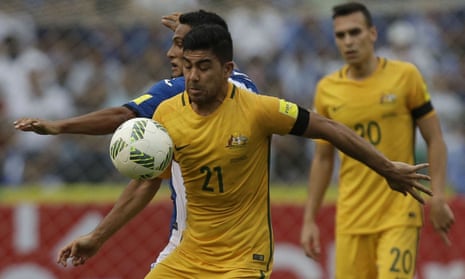The scoreboard may have only displayed 0-0 but Ange Postecoglou can take great satisfaction from how his Socceroos outplayed Honduras in hostile conditions on Saturday. The value of the result won’t become fully apparent until Wednesday but Australia must now be clear favourites to progress to Russia 2018 after experiencing only minor discomfort during a tactically-astute display in San Pedro Sula.
Indeed, considering the enormity of the circumstances, the abysmal playing surface, and the disrupted build-up, Australia’s performance was arguably its best of this marathon qualifying campaign.
Importantly, Australia matched Honduras for spirit in the early exchanges, refusing to be intimidated by the partisan crowd or some robust challenges. After ensuring there would be no alpha-beta relationship, Postecoglou’s strategy began to flourish.
Success began on the magnet board. Postecoglou’s team selection and organisation, especially in midfield, blended brains and brawn in appropriate quantities. There was a rudimentary element to it with three of the four central midfielders belonging to English Championship clubs (Mile Jedinak, Massimo Luongo and Jackson Irvine), and a fourth (Aaron Mooy) who has just advanced after excelling in that competition. These were the horses for just this kind of course, undaunted by intimidating away trips to combative opponents on cow paddocks.
There was nothing rudimentary about how the foursome played. Aligned in a midfield diamond, each was tasked with a specific role that when combined made Australia tough to break down and dominant in possession. Their unity of purpose in effect led to a six-man midfield overload with Aziz Behich and Josh Risdon’s heat maps revealing their participation much further up the field than orthodox fullbacks. It was a plan well-designed and well-executed, lacking only the goal the endeavour deserved.
“We’re just not getting our rewards and that’s the last thing missing from our game,” Postecoglou said afterwards. “Our general play’s great, we’re working hard, we’re just missing a clinical edge, but overall I couldn’t be happier.”
It is a refrain familiar to anyone who has hung around after the full-time whistle to listen to the coach offer his immediate reflections, and one that in previous matches has rung hollow. On Saturday it was hard to disagree; under duress Australia did almost everything right. A more cutting edge approach will be necessary on Wednesday, however, after the graft of an industrious opening leg.
Hull City’s Irvine typified this industry, operating at the most advanced point of the diamond, closest to Tomi Juric. He set the tone without the ball, disrupting the links between Honduras’ defence and midfield, crashing into challenges and establishing Australia’s physicality. It was not a glamourous role, and one unlikely to be repeated in Sydney when a more attack-minded alternative can be expected to start.
The returning Jedinak excelled in his familiar station, patrolling the space in front of his back three. He played with the assurance of a man in peak form, rather than one who has made only three substitute appearances for Aston Villa this season. The round-the-clock dedication of physio Les Gelis to guarantee Jedinak’s participation was time well spent.
The skipper’s certainty set the foundation for Mooy and Luongo to express themselves, and for Behich and Risdon to gambol outside them. It was the dynamism of that foursome that provided Australia’s advantage.
With Mooy operating mostly in an inside-left channel, the Socceroos were able to deftly unpick Honduras on the left, and switch play to exploit the space created on the opposite wing. That approach led to the best move of the match midway through the first half – when the dashing Behich benefitted from Mooy’s vision to create a half-chance that Irvine lashed over the bar.
This was not the surface for an artist like Mooy to display his full range of skills but his technique coped with the conditions better than most, keeping Australia moving forward and adjusting the tempo to suit the match situation. His set pieces left a lot to be desired, however, and Honduras’ ability in the air – considered a weakness before this match – will be tested further in Sydney.
The star of the show was the dynamic Luongo. Operating on the right of the diamond the QPR man was in perpetual motion, busy breaking down Honduran attacks, applying a relentless press and, crucially, taking the game on in possession. His drive with the ball at his feet gave Australia an edge they should have capitalised on. Luongo’s darting run early in the game deserved better than his tame shot straight at Donis Escober, and he was the architect for the second-half header Juric could not direct out of reach of the keeper.
Luongo has long proven himself in green and gold but remains on the periphery of a starting place in Postecoglou’s preferred midfield set-up, one shaped more like a square with Mooy alongside a holding midfielder at the base, and the scheming Rogic and pacey Kruse further forward; in effect a pair of sixes supplying a pair of 10s. By rotating the square 45 degrees the system suddenly demands not only one six and one 10, but a pair of energetic box-to-box eights, a position Luongo fills expertly.
The big question now is: how will Postecoglou apply what he learned in the Estadio Olímpico Metropolitano to the return leg? Will he persist with the diamond? How many pairs of fresh legs will enter the fray? As with home matches against Syria and Thailand in recent weeks, goals are a must in a fixture Australia simply has to win.

Comments (…)
Sign in or create your Guardian account to join the discussion